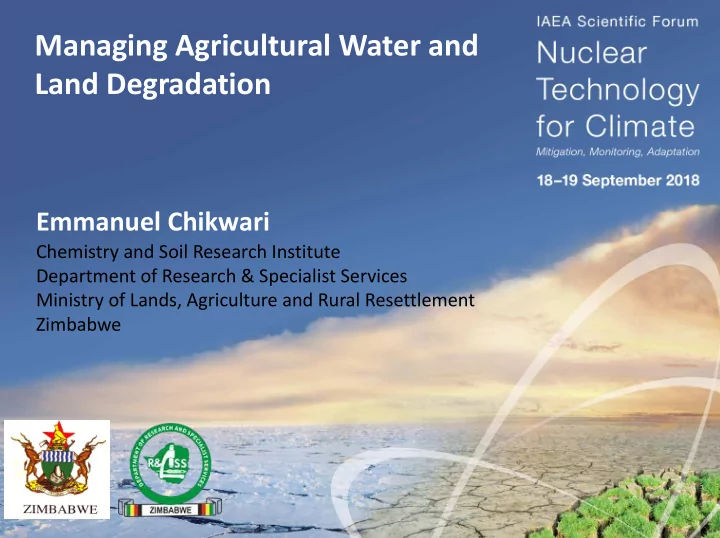

Managing Agricultural Water and Land Degradation Emmanuel Chikwari Chemistry and Soil Research Institute Department of Research & Specialist Services Ministry of Lands, Agriculture and Rural Resettlement Zimbabwe
Agricultural water: The Farmer’s Panacea Water scarcity is one of the • most limiting factors for food security in Zimbabwe and many African countries. Yet water collected is not used • efficiently. With climate change and • unpredictable rainfall events, judicious water use is required.
Land degradation and Soil Erosion is widespread in Zimbabwe
Nuclear techniques can be used to address soil water and land degradation issues TC projects addressing agricultural water and land degradation v RAF5079: “Enhancing Crop Nutrition and Soil and Water Management and Technology Transfer in Irrigated Systems for Increased Food Production and Income Generation (AFRA).” v RAF5075: “Enhancing Regional Capacities for Assessing Soil Erosion and the Efficiency of Agricultural Soil Conservation Strategies through Fallout Radionuclides (AFRA).” v ZIM5021: “Assessing and Promoting Sustainable Agricultural Production in Communal and Newly Resettled Farms.”
Introducing small-scale drip irrigation system and improved water management to Zimbabwean communities Ø Isotopic and nuclear techniques are used to improve irrigation management and maximize fertilizer application Soil moisture neutron probe
Yield of cabbage under different watering regimes, measured using nuclear technique (neutron probe) 14 12 Dry matter yield, t/ha Drip system Bucket system 10 8 6 4 2 0 100% 75% 50% Watering regime
Soil conservation research in Zimbabwe Direct seeding equipment Climate change and variability further aggravate land degradation, soil loss, and sedimentation, affecting soil and water resources & pollution. Effective land management strategies are essential for sustaining soil and water resources. Maize with crop residues cover Nuclear and isotopic techniques (fallout radionuclides e.g. caesium-137) allowed easy assessment of the effectiveness of soil conservation and impact of farming practices on soil erosion control.
Principle of fallout radionuclides (FRNs) methods FRNs (e.g. Caesium-137) get to soil from atmosphere. • They can be used as tracers for soil redistribution as they strongly bind to • fine soil particles and their movement indicates soil erosion.
Cs-137 was used for assessing the efficiency of soil conservation measures in Zimbabwe Makoholi experimental site with soil conservation experiment Gamma Spectroscopy System for Cs-137 measurements Soil sampling for Cs-137 measurements
Efficiency of soil conservation land management estimated by caesium-137 method 8 Soil erosion rate, t/ha/year Cs-137 method 7 6 5 4 3 2 1 0 Conventional tillage Direct seeding with Conservation basins mulch with mulch Farming Practice
Conclusions Nuclear and isotopic techniques are useful for obtaining essential information for: • managing agricultural water and fertilizers • evaluating soil conservation strategies Nuclear and isotopic techniques have supported developing countries in adopting climate-smart agriculture.
ACKNOWLEDGEMENTS • The Government of the Republic of Zimbabwe for support of field activities. • The Joint FAO/IAEA Division of Nuclear Techniques in Food and Agriculture for technical support. • IAEA TC Africa Division for the Regional and National Projects. THANK YOU
Recommend
More recommend